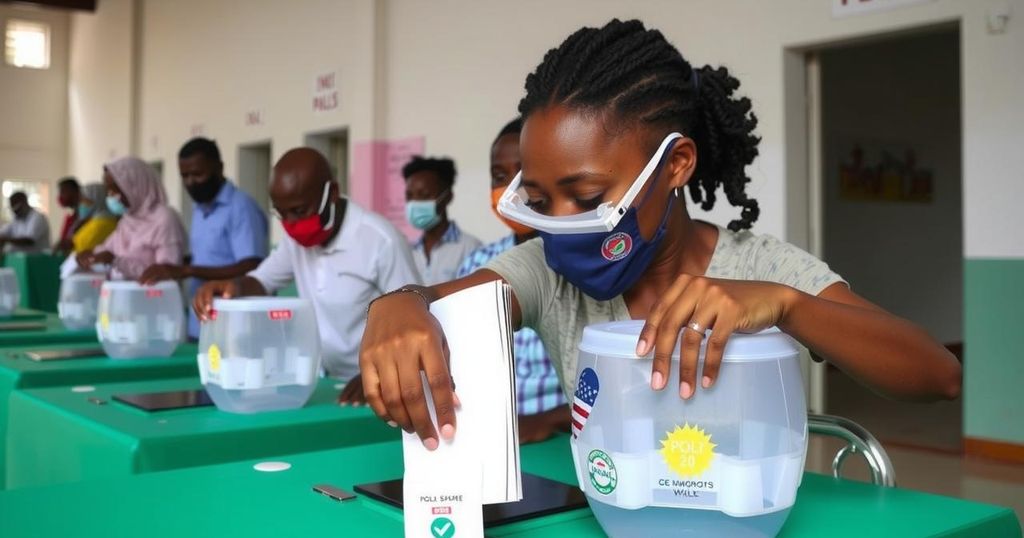World news
ABDALLAH SAMBI, AFRICA, AUSTRALIAN ASSOCIATED PRESS, AZALI ASSOUMANI, COMOROS, ELECTION FRAUD, GOVERNANCE, GOVERNMENT, HAMIDOU KARIHILA, HOPE OF THE COMOROS, INDIAN OCEAN, INDIAN OCEAN ARCHIPELAGO, JUWA, NO, NOUR EL - FATH, OPPOSITION, POLITICS, PRESIDENTIAL ELECTION, REUTERS, SUPREME COURT
Oliver Grayson
0 Comments
Comoros Holds Elections Amid Concerns Over Electoral Integrity
The voters in Comoros are electing members for the 33-seat parliament amid allegations of electoral irregularities from the opposition following President Assoumani’s re-election. Approximately 338,000 individuals are registered to vote, with nearly 100 candidates approved to contest. Opponents accuse the President of authoritarianism and preparing a path for his son to succeed him. Some opposition factions have called for a boycott, while others continue to participate in the election, which will conclude with results expected by Friday.
Voters in Comoros have commenced their journey to the polls to elect representatives for the archipelago’s 33-seat parliament. This electoral exercise follows a previous election in which President Azali Assoumani secured re-election amidst allegations of significant irregularities raised by opposition factions. Ruling party officials, however, have firmly denied these claims. With approximately 338,000 registered voters, polling stations opened early this Sunday. It is worth noting that Comoros last underwent parliamentary elections in January 2020.
The country’s Supreme Court has approved the candidacies of nearly 100 individuals vying for a parliamentary seat. Critics of President Assoumani allege authoritarian tendencies and express concerns regarding his intentions to position his eldest son, Nour El-Fath, as his successor after his term concludes in 2029. Assoumani has held power since a coup in 1999 and has claimed victory in three subsequent elections. In 2024, he conferred extensive powers upon his son, assigning him the role of coordinating all government functions.
Despite calls from certain opposition parties, such as Juwa, led by Ahmed Abdallah Sambi—who is currently serving a life sentence following his conviction in 2022—many choose to participate in the elections rather than boycott them. “The Azali regime is weakened…by participating in these elections, we are contributing to further exposing the flaws in its system and accelerating its inevitable fall,” stated Hamidou Karihila, an electoral candidate representing the opposition Hope of the Comoros party. The results of this election are anticipated to be disclosed by Friday.
The political landscape of Comoros has been characterized by instability and allegations of electoral malpractice. President Azali Assoumani, who ascended to power through a coup in 1999, has operated under claims of fostering authoritarianism. His government has faced scrutiny over its treatment of opposition voices, particularly after the sentencing of former President Sambi. Recent elections have occurred against a backdrop of significant public discontent and tensions among rival political factions, underscoring the ongoing struggle between power and democracy in the nation.
In conclusion, the parliamentary elections in Comoros represent a significant moment in the country’s political framework, as the electorate seeks to assert their voice amid allegations of governmental abuses and authoritarianism. The outcome of this election may influence the future trajectory of governance under President Assoumani, especially in light of concerns over the potential political succession to his son. This election could have profound implications for the nation’s relatively fragile democracy, marked by divisions within the opposition and differing strategies in response to the ruling regime.
Original Source: www.lismorecitynews.com.au




Post Comment